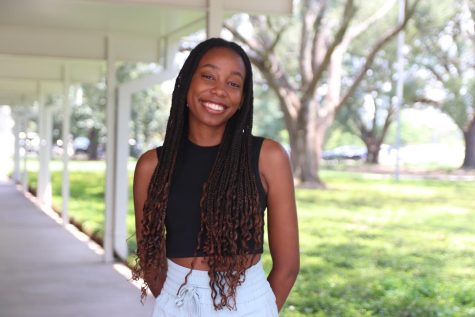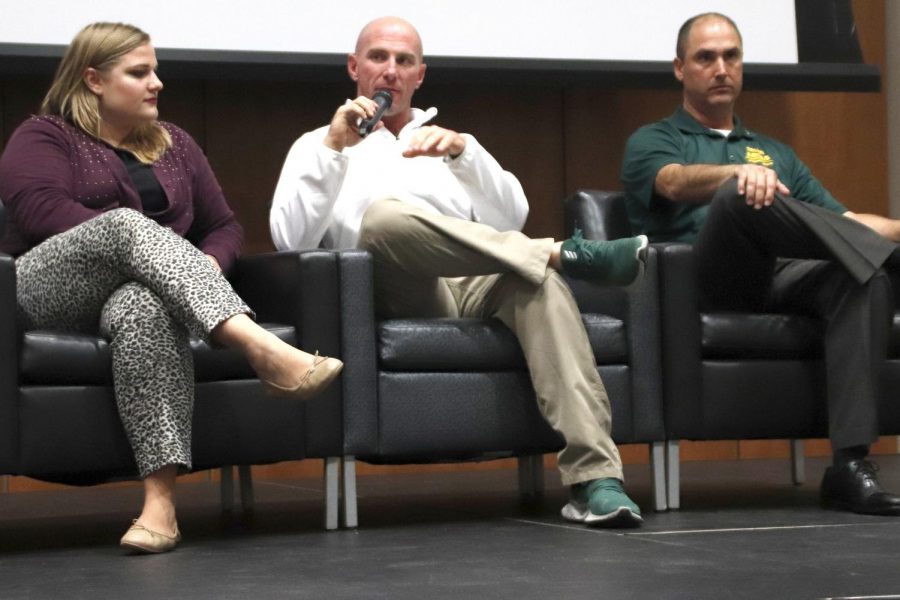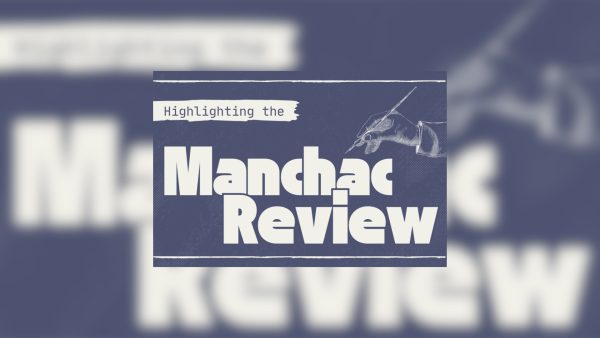Mocktails guest panel creates dialogue with students
Symiah Dorsey/The Lion’s Roar
Matt Riser, head coach of baseball, shares his personal experience with substance addiction in college and discusses the importance of getting help. In the first half of the Mocktails event, the guest panel had an interaction with students to raise awareness for substance abuse.
Prior to attending an annual social engagement, students had the opportunity to learn about the repercussions of substance abuse in a college climate.
The Office for Student Engagement and Campus Activities Board welcomed a panel of guest speakers for the Wild, Wild Western Rodeo Mocktails event. Each speaker shared their personal and professional experiences with alcohol and drug usage.
The panel consisted of Jeremy Weatherspoon, a representative at Oxford House Inc., Zach Knippenberg, a social worker at St. Christopher’s Addiction and Wellness Center, Emily Simcoe, a registered nurse at St. Christopher’s, Emily Meyers, an executive director at the LongBranch Healthcare, Matt Riser, head coach of baseball and Brian Abels, an attorney at law.
Marjorie Parker, director of Student Engagement, explained how the addition of a panel provided a more interactive experience.
“The panel discussion is a little bit different,” shared Parker. “Normally, it’s a speaker, but we figured the panel would be more interactive, especially with us launching our Collegiate Recovery Program with the University Counseling Center. I think the students will benefit from people’s stories, their testimonies, their knowledge and their experiences.”
As the discussion commenced, members from the Collegiate Recovery Program and University Counseling Center navigated the dialogue by asking the panelists about the issues associated with alcohol and drug use.
Riser discussed the social stigmas that revolve around substance use and how it affects personal identity.
“Let’s be honest,” began Riser. “Raise your hand if you drink for the first time for the taste of alcohol. Nobody. You’re drinking to try and fit in and have a good time and socialize. The problem for me is, when it comes to drugs and alcohol, it starts to cover up who you truly are identity-wise. You’re trying to fit in with others around you that you don’t know, and you’re fitting in through the acquaintance of drug and alcohol use as opposed to who you are personally inside.”
Simcoe explained that genetics can play a role in a person’s substance addiction.
“From a medical perspective, I think that what people don’t realize is that some are genetically predisposed to addiction,” stated Simcoe. “You may not even know that disposition at all until you take that first drink and take it to the next level. So, it actually becomes something that’s much bigger than what your intentions were. It can spiral, and it can spiral very quickly.”
Many of the panelists overcame addictions of their own and shared their stories to inspire and educate the students.
Weatherspoon discussed how a support system helped him during his journey to recovery.
“I know that my journey through recovery is partly based on the network of people that I have to support me,” said Weatherspoon. “I feel like I’m in a movie, and so I’m not really able to see the things that I’m engaging in or how my behavior is affecting others. My support system gets to look at that movie, so I think that would be a great preventative method, just surrounding yourself with good people that love you and have your best interest at heart.”
Your donation will support The Lion's Roar student journalists at Southeastern Louisiana University.
In addition, your contribution will allow us to cover our annual website hosting costs.
No gift is too small.

Symiah Dorsey is a communication major from Laplace and serves as Editor-in-Chief. Raised in Europe, Symiah is an avid lover of languages, traveling and...





